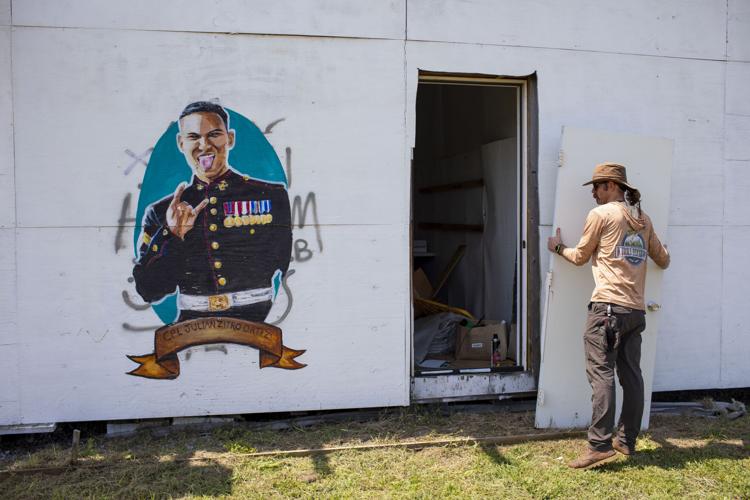EDISTO ISLAND — On 19 acres of farmland, Cody Callarman began growing hemp in a small shed. With the weeks-old puppy he'd found on the land by his side, he prepared the crop before eventually planting the seedlings in the ground.

Cody Callarman, founder of Carolina Dream, stands in the Edisto Island building on April 2, 2024, where he and his company grew hemp for a while.
That was four years ago. Today, much of the land that once held Callarman's crop sits unused. Deer eat at the weeds. Hazel is no longer a puppy.
"It was a green rush, everyone thought this was a cash crop," Callarman said. The Marine veteran owns Zitro Farms and Carolina Dream, a hemp-based product company on Edisto Island.
He was one of many farmers across South Carolina to jump at the opportunity to plant the crop after the federal 2018 Farm Bill made it legal for farmers to grow hemp.
Hemp is derived from the same plant as marijuana, cannabis sativa, but contains little of the psychoactive compound known as THC. It tends to contain more CBD, the non-psychoactive compound typically used in products like edibles, seltzers and oils.
The number of South Carolina farmers permitted to grow the crop peaked in 2020, at 265. That number has steadily dropped. Only 132 farmers were listed as permitted hemp farmers in the state last year as the value of the crop has plummeted in recent times.
The farmers, along with industry experts, said state regulation and an oversaturated market have stifled the crop's success, even as companies have begun introducing more hemp-based products like seltzers and gummies.
Too much hemp
Hemp sits untouched in a Greenville warehouse. The plant, which many believed could save farms financially, continues to hemorrhage value.

Cody Callarman holds a jar of the first version of Carolina Dream’s CBD gummies on Tuesday, April 2, 2024, on Edisto Island.
When the Farm Bill was signed into U.S.law in 2018, only 20 South Carolina farmers were permitted to grow hemp as part of a pilot program the state rolled out. The next year, after the state removed the initial cap on permitting, that number jumped to 161. In 2020, it peaked at 265.
"We had farmers plant 40 or 50 acres of the stuff ... then we realized in that timespan that growing 40 or 50 acres at the yields we were getting was way more than the market could stand," said David DeWitt, a member of Clemson University Extension's Agronomic Crops Program team.

Numbers of permitted hemp farmers in SC
200
A total of 265 SC farmers were farming hemp in 2020 before a steady decrease in the past three years.
100
Only 20 hemp farmers received permit by law.
2018
2019
2020
2021
2022
2023
SOURCE: SC Department of Agriculture
HONGYU LIU/STAFF

Numbers of permitted hemp farmers in SC
200
A total of 265 SC farmers were farming hemp in 2020 before a steady decrease in the past three years.
100
Only 20 hemp farmers received permit by law.
2019
2020
2021
2022
2023
2018
SOURCE: SC Dept of Agriculture
HONGYU LIU/STAFF
Too many farmers planting too many acres, combined with a lack of understanding of both the regulations and the science of growing a relatively new crop, resulted in an oversaturated market and hemp that failed to meet shifting standards.
Even in situations where farmers were following regulations, some faced issues with law enforcement agencies, as was the case for John Pendarvis. His Dorchester County hemp farm was destroyed by state law enforcement agents in September 2019. Pendarvis eventually filed a lawsuit against the agency and SLED was ordered to pay more than $11,000 in sanctions.

Zach Serrins, head of growth, plays with Hazel, the farm dog at Zitro Farms, on April 2, 2024. Carolina Dream used to grow hemp at this Edisto Island farm.
The number of permitted hemp farmers has been in steep decline since 2020 and many of the permitted farmers don't grow the crop anymore, said Nate Futral, who works with PHP Processing in Greenville.
Growing the plant is complicated. Regulations require that a hemp crop must contain less than 0.3 percent THC by dry weight, which requires methods new to farmers, Futral said.
When crops didn't meet the regulatory requirements and had to be destroyed, many growers got out of hemp farming. For those who keep growing, the payoff can be meager. Callarman said he used to get anywhere from $15 to $20 a pound for biomass, used to produce CBD oil. Now that same amount is worth less than a dollar.
A national downturn in hemp farming, but not hemp products
South Carolina isn't the only state to see a dip in hemp prices. Nationally, the value of hemp dropped 71 percent from 2021 to 2022, according to the U.S. Department of Agriculture's national hemp report. The number of acres of hemp farmed and harvested was nearly cut in half during that same time, according to the report.
The downward trend comes as more and more South Carolina companies shift to producing hemp-based products. But even down-line producers of hemp products face regulatory hurdles.

A tilled field, seen here on April 2, 2024, where Carolina Dream used to grow hemp alongside plants in a building on Edisto Island.
Columbia-based beverage producer Peak Drift Brewing Company was on the verge of breaking into the CBD seltzer market, alongside other key players like Rebel Rabbit in Greenville and High Rise in Charleston, when confusion over the state's regulation of the product put plans on pause.
A month later, in a Feb. 22 letter, the state's health department clarified the regulations and Peak Drift continued with its plan. But the brewery's operations manager, Jason Snyder, worries the fear and confusion around hemp-based products could cause some retailers to shy away from offering the company's products in stores.
"This is already creating a situation where retailers are gun shy ... we're damaging the industry before it's even started," Snyder told The Post and Courier.
Plummeting profits

A wall on the interior of Carolina Dream’s building where the company used to grew hemp shows a web of ideas, seen here on April 2, 2024, on Edisto Island.
Inside the dilapidated 2,000-square-foot shed on Callarman's land, uneven fluorescent grow-lights hang from the ceiling. A bag of moldy sugar and a test batch of hemp gummies sit on a cluttered table. Scribbled on the wall in colorful ink is a giant web of ideas — "legal advocacy," "no one should suffer," "helps PTSD" — all tied back to a center square titled, "The Dream."
Since Callarman first farmed the crop in 2020, its value has dropped significantly. He made anywhere from $800 to $1,000 per pound for his first batch of indoor, smokable flower. Eventually, the price dropped to $200 per pound and he hit the pause button. When he was selling the smokable flower, he had to sell it out of state.
"It wasn't worth keeping the electrical bill on at that point," Callarman said.

Carolina Dream employees (from left to right) Bill Jarboe, Cody Callarman, Zach Serrins, Chris Schneider and the farm dog Hazel stand around a tractor at Zitro Farms on Tuesday, April 2, 2024, on Edisto Island.
It's been years since Callarman has grown hemp for commercial purposes in that shed. He's mostly shifted his business model from growing the plant to manufacturing products like gummies and oils with pre-processed hemp from other states. He hopes that eventually he can grow hemp on his land again.
Some industry experts, such as PHP Processing's Futral, believe the industry will eventually become more profitable.
While the price of the crop continues to drop and the number of farmers leave it behind, Callarman said the main thing keeping him in the business is his passion for it.
"I'm always optimistic," Callarman said. "The way I look at it is, we're on the winning side of this."

















